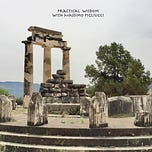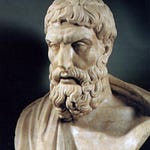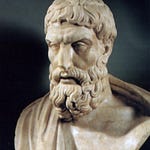“Let us go back again to the good being sought, whatever it might be. For it appears to be one thing in one action or art, another in another: it is a different thing in medicine and in generalship, and so on with the rest. What, then, is the good in each of these? Or is it that for the sake of which everything else is done? In medicine, this is health; in generalship, victory; in house building, a house; and in another, it would be something else. But in every action and choice, it is the end involved, since it is for the sake of this that all people do everything else. As a result, if there is some end of all actions, this would be the good related to action; and if there are several, then it would be these. …
Happiness above all seems to be of this character, for we always choose it on account of itself and never on account of something else. Yet honor, pleasure, intellect, and every virtue we choose on their own account—for even if nothing resulted from them, we would choose each of them—but we choose them also for the sake of happiness, because we suppose that, through them, we will be happy. But nobody chooses happiness for the sake of these things, or, more generally, on account of anything else.”
(Nicomachean Ethics, 1.7)













Share this post